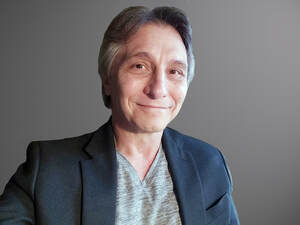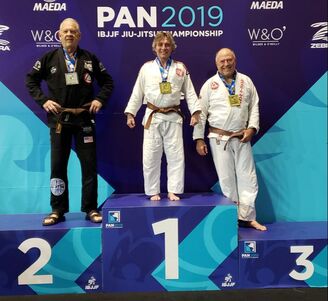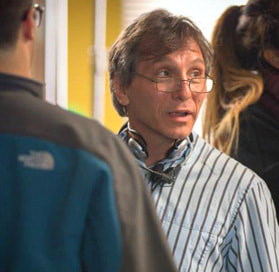|
Lessons from a master screenwriting and acting coach Ryan Stride interviews Brian Herskowitz Our next interview is with LA-based film producer, director, scriptwriter and best-selling author, Brian Herskowitz. He started his career in the industry as an actor but quickly directed his energy and passion into writing scripts for too many television shows and feature films to mention. He is the Chief Creative Officer at Crypto Film Fund, an investment platform that allows anybody to participate in the funding in the entertainment industry and is the lead faculty in screenwriting for the Boston University in Los Angeles 'The Writer in Hollywood' program. He is also a black belt in the gentle art of Judo and has been a very successful competitor in this tough sport. RS: Welcome Brian, how are you and your family now as 2020 continues down this strange path? BH: Hi Ryan. The future, or at least, the immediate future is a bit of mystery to everyone in the world of entertainment. In a strange way, not much has changed for me. As a writer, I often work from home and as a producer, I spend a great deal of the time working the phones Those two elements feel very much the same. The world of production, however, is in limbo. My wife is an actress so she too hasn't felt the impact directly yet except that she has a series in which she has a recurring role on and that series was picked up for a second season. RS: Right so I guess like many in the acting profession she must be wondering when the series will recommence. I know people are thinking about how the current pandemic will affect factors such as on set safety and the way filming will occur. You've been in the film and television industry a long time. I bet you have seen it being affected by all kinds of social influences, current affairs, technology and major crisis. How do you think this pandemic will affect the creative world? BH: Initially, you're going to be working with smaller crews, smaller casts, less extras. I believe extra precautions will be implemented. Crew and cast will have to go through a medical screening process. I can also envision productions doing a modified "mask and social distancing" protocol where the crew have to wear masks, maintain distance unless absolutely necessary, and the cast doing the same until the cameras are rolling. I hear that most producers are expecting a new class of crew member as well. A safety person, a sanitation person, and a full-time medical person in the crew. Producers are going to need to include those extra costs in their budgets. This of course will depend upon testing availability and reliability. We're all hoping for a vaccine, or a proven treatment. RS: Sounds like a lot of new factors and planning will be taking place but production teams are experts in coordinating and organising big scale projects so I guess they will be figure out and manage a good way forward. Now screen writers, like most writers, have to, in some ways, live an isolated life to get their projects completed. Has your experience as a writer helped you keep in the calm zone during the lock down? BH: Oh, for certain. Like I mentioned, I spend a great deal of my time, when not in physical production, in a sort of self-imposed isolation. I am sure there a tens of millions that are struggling with cabin fever. RS: Now I understand you are long time student and competitor in the martial arts- and a 5th Dan Judo black belt, right? Do you think the martial art movie genre could do with a new fresh coat paint? BH: That's an interesting question. Let me think about that. Well, in some ways, the genre has gotten a fresh coat or two. While not specifically a martial arts movie, Quentin Tarantino's Kill Bill trilogy was an homage to both Japanese and Chinese Martial arts movies, and more recently, the John Wick series has highlighted and elevated martial arts in their choreography. If you're looking toward a purist version of a "martial arts" movie where the hero is a master who must face impossible odds with their bare hands... absolutely, that is a genre that's been with us in various forms, but could certainly use some new thinking. David Mamet, who is a Brazilian JiuJitsu student as well as a helluva writer tried his hand with Red Belt but I didn't think it was a particularly stellar attempt. I do know of a few that are in development now. One that's interesting is being written and developed by Bo Svenson, an actor, writer, producer. He has the Rusty Kanakogi story, and it's a bio-pic about one of America's first women judo competitors. RS: I remember Mamet's film Red Belt. It starred Chiwetel Ejiofor who I thought played his role well and yes, I also like Mamet's work. There were some other very talented people in the cast like Emily Mortimer and Max Martini. There have been a few famous Judoka involved in some areas of the film industry such as respected stuntman Gene Lebell, and more recently MMA fighter Rhonda Rousey. I know there are other famous martial arts actors who have some Judo experience like Chuck Norris. I think Keanu Reeves also trained in it in preparation for the John Wick role. I guess the physicality of that art lends itself well particularly to films involving action. Have you ever encountered any famous martial art actors in Hollywood? BH: Well, I know two of the four you've mentioned. I have worked with Gene as a stuntman on a film titled For Better or Worse directed by Jason Alexander. I've also trained with Gene over the years. He used to have a class at Los Angeles City College and I was a member of their judo team at that time. The head instructor was 9th Dan Hayward Nishoka, but on Monday nights Gene would teach judo or wrestling. As for Rhonda, I was a training partner of her mother's. Her mom Ann Maria DeMars was the first person from the U.S.A, male or female, to win a world Judo championship. I have had the pleasure to meet Rhonda through her mother, and she could not have been more gracious or genuine. In addition, I teach judo at a Brazilian JiuJutsu dojo that is owned by actor Sean Patrick Flannery. Sean has a storied career as an actor. He starred in the film Powder, was the titular lead of The Adventures of Young Indiana Jones, and is the star of Boondock Saints. Sean is a black belt in BJJ and a heck of a nice guy. Also, Bo Svenson is a black belt in judo and a world masters champion. He was a regular in TV for many years and starred as Buford Pusser in the film Walking Tall. I have also had the pleasure of meeting David Mamet, writer/director/martial artist. There is a pretty sizeable number of members of the performing arts that have training in the martial arts. RS: I am familiar with Sean's work. Interesting actor especially in that film Powder. I also remember him in Boondock Saints where he co-starred with Norman Reedus- an actor who in my opinion is ahead of years acting wise. It is also amazing that you have trained with Gene Lebell as he is so respected in the martial arts world and the grappling game. Brian it seems your martial arts lifestyle is as full on as your film work! Have you been able to do much working out during the lockdown? BH: Every day. I do body weight exercises like pushups and handstand pushups, sit-ups, lunges, and I jump rope for cardio and go for walks... with a mask. And I really wish everyone would wear a mask. Not for themselves, but for me. RS: You're obviously comfortable with the action side of film and television as you were an associate producer of Tour of Duty- a very popular show about the Vietnam War. What was good about that show was that it also seemed to convey the painful and costly side to war- it wasn't just action for the sake of it. It also showed the human, vulnerable side to those who had to experience war. What were your experiences working on this show? BH: This show was a wonderful education for me regarding the technical side of film and TV and the enormous machinery you need to produce a weekly series. I started as post production assistant, moved up to Associate Producer and then had the chance to write in the shows third and final season. That script lead me to signing with William Morris and have a writing career. I am forever grateful to the folks there and I am still in touch with many of them. One interesting side story. The film was shot on Super 16mm film, then telecined to 1-inch tape for broadcast. The editing was done on one of the first non-linear editing systems called "Ediflex". It consisted of a computer that was controlled by a light pen, and 12 VHS decks that would ramp to the section of dailies you were editing. That meant we had to make as many as 25 VHS tape copied of dailies every day. The head editor was a guy named John Duffy and he was tough and very talented and he taught me a great deal about his craft. Another one of our editors was Bob Senise. He told me that his son was an actor working in Chicago and was involved in the Steppenwolf Theater company... I later realized that his son was Gary Senise. RS: When you talk about the technical side to production it really shows just how work goes into a production whether film or TV show. Now you have coached screen writers in a craft that some might say is a far more complex process than perhaps some other forms of writing. Screen writing requires patience, discipline and belief. What other qualities do you try to get your students to develop or discover? BH: All of the qualities you mentioned and I would add: imagination, observation and logic. We have all seen films or TV shows where you are taken out of the story because the story or character logic didn't feel organic. You have probably read scripts where all the characters sounded the same or felt like stick people and not real. But real is a relative term. I believed everything Roger Rabbit did in Who Framed Roger Rabbit in spite of his being a cartoon and I bought that Jake Scully could transfer his mind into the body of a seven-foot-tall blue Na'Vi [In Avatar]. It is the way that you build your world and craft characters that makes the audience suspend disbelief. RS: Yes, interesting points Brian. For anyone thinking of writing a script right now- do you think there is a market right now for a particular genre or type of film? BH: Not really. There are some genres that may have a slight edge in terms of audience size, but people crave good no matter what form it takes. I watch a fair amount of documentaries, but I also love a good romantic comedy, horror, fantasy, action or suspense. One of the problems with suggesting a writer go with a particular genre because it's "hot" at that time is that by the time they have written their script and taken it to the market, there is a very good chance that people's appetites have changed. RS: Yes, another useful point especially when we consider how long it can take for a script to evolve into finished film. It is interesting that you are also an acting coach- so when you watch a film and the actors on screen, I'm wondering if you are looking at the film through very different eyes to the typical viewer? BH: Less so with the acting than as a director. I try to stay in the moment and just watch, but like anyone in any business that you are in for a long time, you start to see the tricks of the trade and once you've seen them it is difficult not to see them. But one thing I try to impart to my students and that I try to do myself is to be the audience. So when I read a script, while a part of me may be judging the structure, or the dialogue, or story logic, I am trying very hard to just be the audience. The same with an actor. When I coach, I am trying to help the actor find the truth of what they are saying as it applies to the story and how it will affect the people watching. RS: Finding the truth of what we are saying or doing could be applied to life as well as art I guess, so I really like that. Your wife Gina Hecht is also an actress who has appeared in so many top TV shows including: Mork and Mindy, Seinfeld, CSI, ER and Friends. Has her acting experience influenced or contributed to the way you coach? BH: I would certainly think so. We both studied acting with Milton Katselas and he influenced both of us. In addition, Gina has a keen artistic eye and an excellent ear for dialogue. On top of that, I am terrible at proofing my own work. Commas are my enemy and typos lurk in every corner, and she's someone that doesn't let anything slip by. RS: Well we will have to get her here to do an interview soon and we will discuss your war with commas! Are there any actors or actresses (other than Gina!) right now who you really admire in terms of the way they use their acting talent? BH: I am a big Ryan Reynolds fan. I like Robert Downey Jr, Margot Robbie. I think Shira Haas who was in Unorthodox is amazing. I think Jason Bateman can do no wrong. Frankly, there are so many great actors in film, TV, stage that it's hard to list them all. Jason Alexander from Seinfeld is a triple threat and uber talented. Will Smith has grown from Fresh Prince to Muhammed Ali. Truly too many to name and for different reasons. Kumal Nanjiani to Ed Norton Jr. to Gary Oldman, I would be hard pressed to make a short list. RS: Yes, many great actors out there. Robert Downey Jr really seems to bring something deep to his roles and glad you mentioned Jason Alexander. His George Costanza character always make me laugh. I understand you have also done acting workshops with other actors. Didn't you do a workshop or seminar with Michael Chiklis- who is a great actor especially in The Shield? How was that experience? BH: I wish I had but he has been a guest speaker at my Boston University in Los Angeles classes on several occasions and is just a wonderful supporter of the program. And see, there's another actor I admire that I didn't list. RS: Brian when someone comes to you for acting coaching- are you often helping them prepare for a specific role and if so, how much research will you do on that role or the background surrounding the character? BH: I work with writers and producers more often than actors, but when actors do come to me for coaching it is for a specific role. I don't do much research because that's their job. I may ask them the questions that I feel they need to know. How was the character brought up? Where were they born? What kind of education did they have? Do they have any physical quirks or handicaps? The actor should know who they are portraying inside and out. If they don't know the answer then we may work to find that together. RS: Your main martial art is Judo which requires the student to understand how to borrow the opponent's force or desire to over power. Judo also requires a gutsy, no nonsense attitude where sometimes a bout can go on for a while and get scrappy. It may take time to find that opening. Do you think there is a parallel there with the creative process where sometimes it's just about working with what's there and other times you better be prepared to grapple with your project or maybe just hang in there, Rocky Balboa style? BH: I find and use martial arts and sports often as a metaphor for writing. Mainly when discussing the process. I think one of the biggest mistakes an actor, a writer, or any creative can do is to focus on the end product and not the process. When I was a young actor/writer/competitor in judo I read a book on sports psychology that had a profound effect on me. In the book they discussed how Olympic and professional athletes when asked what they think about prior to their events all focused on the process. What the high jumper visualised was what his angle of approach would be, how fast he needs to move, how he pushes off with his right foot, the arch of the back and so on. Not "I see myself winning." In my own experience, I've competed at the international and national level and inevitably if I focused on winning, I would choke; if I focused on process, even if I didn't win, I could feel good about my showing. This idea of the process leading to product was the basis for my text book. RS: Love what you mention about focusing on the process. Brilliant. BH: I was involved for a time with Hollywood International Film Academy and the owner of the school interviewed me and asked me: "How do you write an academy award winning script?" My answer; "You don't. You write the best script that you can write and if the members of the academy agree that it's exceptional, it wins the academy award." But I think many writers start out with the idea of "I'm going to write a hit." You can't. You have zero control over a film's success or failure. On the other hand, you have total control over the quality of the work, how complex and well rounded the characters are, how real and clever and moving the dialogue is. You control the structure and the action. What you cannot control is the box office or the critics. RS: That's a great insight for script writers out there. So, Brian what are the main projects you are working on at the moment? BH: I just finished a short that is a pilot for a short content series. It's just now going out to festivals, so I'm not able to share it but if people want to learn more about it, they can go to www.murrayghost.com. I am also serving as the CCO of a new start-up company Crypto Film Fund. I think this is a company that has potential to energise and reform the film and entertainment side of the industry. They can learn more about CFF at www.CryptoFilmFund.com. I also have several feature projects I am developing and once the restrictions ease, I hope to get them funded and shot. I intend to direct several of those. Lastly, I am working with a few other writer/producers to get their projects off the ground. A terrific writer in North Carolina. Bruce Bernhard, who has purchased some terrific IP (mostly books, but an old movie or two as well), and a few Los Angeles based writers that have asked me to either consult or produce their work. So, thankfully, even in this time of isolation, I am keeping busy. RS: My book The Peace Dimension introduces a number of meditations and it conveys The Peace Dimension as something abstract but you could see it as that neutral ground from where creativity can spark. What does The Peace Dimension symbolise to you? BH: I think there's a zone that artists and athletes both seek when they are pursuing excellence. This is discussed in an amazing documentary titled Happy and it looked at happiness around the world. What was fascinating was that money, comfort, location wasn't what brought happiness. Community, love, friendship, giving, being of service were much bigger influences on whether you were happy or not. One of the segments looked at this idea of the zone, and artists who paint, write, sculpt or perform all have had that experience where the work is flowing and the imagination is open and free. The same is said for the runner or martial artist. There's a measurable change in the way the brain functions when in that zone. It is clarity, it is open, and it is peaceful. I have felt that as both an athlete and a writer. I find that it is similar to mediation, or maybe even closer to the concept of mindfulness where you aren't disconnected, if anything you're MORE connected. That place which I believe comes from your core is my interpretation of The Peace Dimension. It is free from concerns, and open to the imagination. RS: Great insights again. Brian it has been really great having this time to be able to discuss your work and thank you for sharing with us some of your experience. I hope any actors or screen writers out there will seek you out for some coaching and gain from your expertise. I was wanting to say for those who want to learn more about screen writing do check out Brian's book: Process to Product: From Concept to Script: A practical Guide for the Screenwriter The Peace Dimension by Ryan Stride is available on Amazon.com and Amazon.co.uk Copyright © Ryan Stride 2020 All rights reserved Comments are closed.
|
AuthorBorn in London, England, Ryan wishes to share with people how the mystical can be found in the moment, allowing great things to happen. Ryan is also a writer and social commentator who is currently working on a script and several new book titles. ArchivesCategories |




 RSS Feed
RSS Feed
